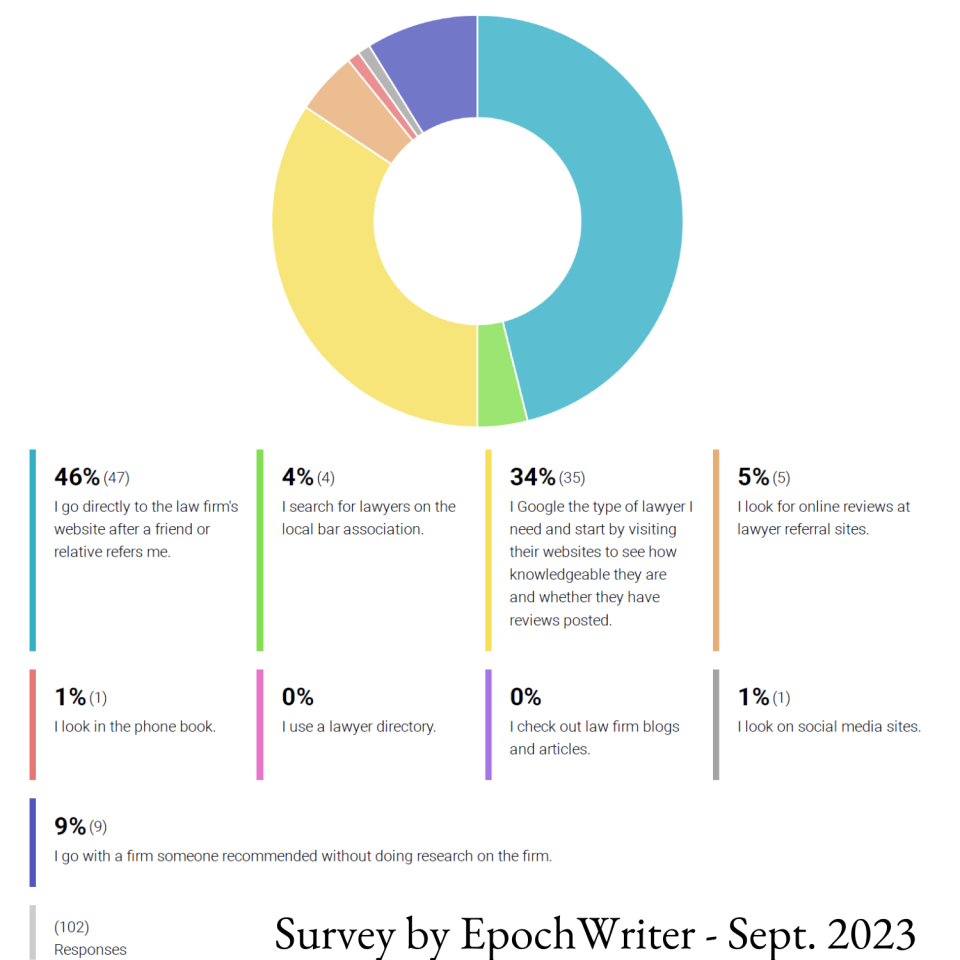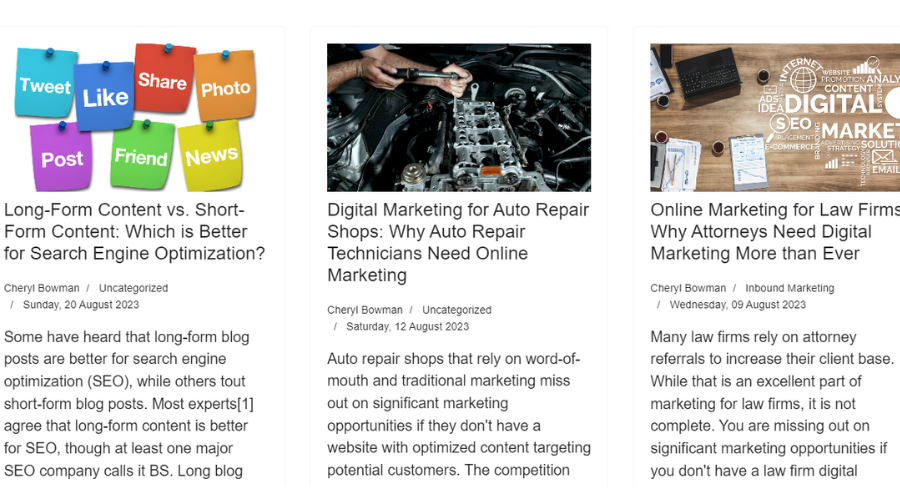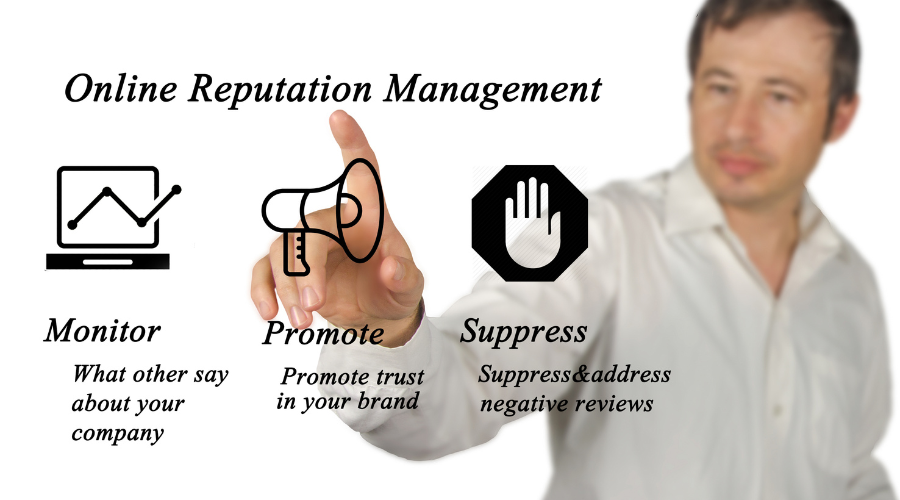Finding clients has never been easy for attorneys – they relied on word of mouth, the phone book, the Yellow Pages, and other methods of marketing. It wasn't until June 1977 that the Supreme Court ruled that commercial speech is protected under the First Amendment. Over the years, attorneys started advertising on television and radio. With the increase in the number of people with access to the Internet, it is imperative that attorneys up their marketing game.
Internet marketing is significantly less expensive than radio and television marketing and can reach more people. Whereas radio and television only reach people within the listening and watching area, plus only those who watched that channel, the Internet opens up a law firm's marketing to anyone with the Internet, thanks to search engines.
Changing Consumer Behavior
That long-ago 1977 ruling also meant that law firms and attorneys could also market themselves via the Internet. However, there's a catch: You must be able to rank on search engine results pages (SERPs) for potential clients to find you. Otherwise, you're back to word-of-mouth and phone books.
Because information is so freely available online, potential clients can make a more informed decision when choosing an attorney to represent them in potentially life-changing cases. The more information a potential client has about the firm and its attorneys, the more chance the tire-kicker will convert into a loyal client.
Potential clients realize this and will spend time browsing through attorneys' websites to determine which attorney or firm can help them get the best outcome. Understanding the world of digital marketing is a must if attorneys wish to remain visible to the general public.
Statistics for Consumers Looking for Attorneys
EpochWriter ran a survey on how consumers find an attorney. We did not specify what type of law, whether civil or criminal, nor did we specify practice areas. We surveyed 102 participants and found that:
- 46 percent go directly to the law firm's website after a friend or relative refers them.
- 35 percent Google the attorney or law firm and go to the website to see how knowledgeable the attorney or firm is and whether they have reviews posted.
- 9 percent take the word of a relative or friend and do not do any research.
- 5 percent look for online reviews on third-party sites.
- 4 percent search for attorneys on a bar association's site.
- 1 percent look on social media.
- 1 percent look in the phone book.
Eighty-one percent of the participants use the Internet to find the attorney they need, whether visiting a website after a referral or Googling. Thus, attorneys must have a major online presence, including ranking on at least the top three search engine results pages.
Attracting Potential Clients Via the Internet
Because the Internet is the epicenter of business growth and client acquisition, law firms must be able to connect with potential clients online. However, you must do more than connect: You must be able to convert those readers into clients. You can do that by carefully crafting your brand to show potential clients that you are authoritative, trustworthy, experienced and an expert in your field.
Building a Strong Online Presence
Attorneys and law firms should build a strong online presence that focuses on organic search results. While pay-per-click (PPC) can get you there, it is also an ongoing expense. The initial setup for organic search engine optimization (SEO) also has its costs, but many of those are the same as the initial costs for PPC. Both require a website, blogs, social media accounts, and landing pages.
However, once that is out of the way, you may pay for blogs and social media marketing each week, which is considerably less than pay-per-click marketing. The biggest downside of PPC, which can cost thousands per month, is that the best keywords cost significantly per click.
For example, for the six keywords "personal injury attorney," "personal injury lawyer," "car accident attorney," "car accident lawyer," "truck accident attorney," and "truck accident lawyer," the cost per click is an average of $0.64, and there is no guarantee that your site will end up at the top of the paid results.
Additionally, you pay for many "wasted" clicks for those not interested in hiring you. People may click for many reasons, including looking for free information or clicking on a link by mistake.
CPA is the cost per action. If you receive one conversion at $4 and one at $2, the average will be $3.
How Organic Search Engine Optimization Works
Search engine optimization relies on content that meets Google's standards. It must be high-quality content that shows expertise, experience, authoritativeness and trustworthiness. Potential clients also look for the same – they need to know you can help them with their legal issues and need to be able to trust you.
The downside of PPC advertising is since you pay for it, it doesn't matter how great your content is – and that can lead to an extensive amount of wasted money. If a potential client doesn't think your website shows you have the experience and expertise to win their case, they won't hire you.
A strong online presence includes:Your Website's Main Pages
The main pages of your website serve as your firm's digital storefront. In many cases, they are the first thing a searcher sees, so they should make a powerful impression. You can do that by:
- Creating a user-friendly design by ensuring your website is easy to navigate and visually appealing. Clean, modern designs that feature responsive layouts and intuitive menus are a must.
- Creating compelling content. Everything on your web pages must be of high quality, informative and engaging. Take this opportunity to convey your value and showcase your services.
- Implementing SEO optimization. Search engine optimization is the art of choosing the best keywords and implementing them naturally into the content. The keywords are just a part of getting your website pages to or near the top of search engine results pages (SERPs). The keywords are those that people are most likely to search for and those that Google is looking for.
- Creating calls to action (CTAs). A call to action should be precise, persuasive and clear. It should tell potential clients to take a specific action, such as calling the firm to set up a consultation or free case evaluation.
Blogs
You have a powerful tool to attract potential clients: Your firm's blog. The blog is where you show that you have the experience and expertise in your field. It allows you to build trust and engage with potential clients. To make the most of your blog, you must:
- Post informative and relevant content consistently.
- Conduct keyword research to identify topics and phrases relevant to your firm's practice areas. You must use the keywords in strategic places throughout the blog to improve search engine optimization and attract organic traffic.
- Create quality content that addresses potential clients' pain points, interests and questions. Content may include industry insights, practical tips, and thought leadership to establish credibility.
- Encourage reader engagement by allowing comments on your blog posts and responding to them as quickly as possible. It is this interaction that builds a sense of community and trust with potential clients.
Landing Pages
Another method of inbound marketing is landing pages. These are one-page websites geared to one specific topic. Depending on your firm makeup and strategy, you might have a landing page for each attorney or a landing page for each practice area.
Landing pages link to the main website. They must also have top-quality content optimized for search engines, in addition to being written for people first.
The type of content on each landing page depends on the audience you want to target. Some firms might create a landing page for each attorney, some might create a landing page for each practice area, and some may create landing pages for both.
Regardless of what you choose to put on your landing page, it is always one topic. A landing page geared toward an attorney would include all the attorney's accomplishments, including awards, publications, courts where the attorney is admitted to practice, law school, bar admissions, and more. It should also include something personal about the attorney as a way to connect with the reader.
A landing page geared toward a practice area might include information about the practice area, such as what it is, the firm's experience in the practice area, and case results.
Social Media
Many people overlook social media as a valid advertising channel. Social media is one of the best ways to get your brand out to the public for many reasons, including:
- Widespread user base
- Maintain a visible and active presence
- You can target specific audiences
- You can build brand authority
- It offers two-way communication between your firm and potential clients
- It allows you to promote specific content
- Your content could go viral
- It has analytic tools so you can see who you are reaching
- It is more cost-effective than radio, TV, and some other forms of advertising
- It gives you a competitive advantage over those who don't use social media
Social media is one of the easiest ways to build your brand's trustworthiness and authoritativeness. It allows you to show your experience and expertise to a wide audience.
User Experience
Google looks at user experience (UX) as part of its algorithm for search engine rankings. Your page must look good on mobile phones, tablets and computers. You can create two pages: one for smaller screens and one for larger screens. We found that sites designed for mobile often look bulky on large screens, while those designed for large screens often give readers a wall of text.
However, the site designed for a large screen is better on cell phones than the site designed for cells on larger screens. As long as your web designer uses a responsive design, a site designed for large screens will look fine on smaller screens.
For a site to have a good user experience, it must have the following:
- Core Web Values: Performance, accessibility, best practices, and SEO.
- Security: The page is secured with HTTPS.
- Displays Well on Mobile: The buttons and other interactive content on pages are large enough for mobile displays.
- Lack of Excessive Ads and Other Intrusive Material: Pop-ups, slide-ups, ads on the side and other intrusive material detract from the user experience, as they are distracting.
- Easy Navigation: Menus should be easy to access and read, including on mobile devices.
- Visitors Can Differentiate Between Main and Other Content: The main content, usually used for inbound marketing, and other content, such as blogs, should be separate and easily discerned by the reader.
Google doesn't use just one page experience "signal" for its rankings. Rather, it looks at all of them to calculate an overall user experience for the page. Sometimes, it doesn't use all aspects of the page experience to contribute to rankings.
Additionally, just because you have great stats, it doesn't mean that it's a guarantee for a high search engine results page (SERP) ranking. As for the importance of page rankings, Google wants to show the most relevant content. Create a great user experience by developing content geared toward the reader, and the rest will come.
Search Engine Optimization for Attorneys
SEO is based on creating content that contains specific keywords for your site. For example, if you are a personal injury law firm, you might optimize your home page for personal injury in general while you have separate pages for each practice area. A car accident page would contain keywords relating to car accidents, while a truck accident page would contain keywords geared toward truck accidents.
If you are trying to draw in clients injured in a truck accident, you wouldn't necessarily want "car accident" as a keyword. The goal is for high visibility on search engine results pages.
Keyword ResearchThe power of keyword research is such that if not done correctly, it can break organic search engine optimization (SEO) efforts. It is imperative that your digital marketing uses words and phrases that potential clients use to locate you online – and make the search engines happy. The correct keywords will be:
- Relevant: The keywords must relate to the needs and interests of your audience. Creating content around relevant keywords increases the chances of attracting potential clients who need your services.
- Visible: No one will ever find you if you are not visible online. Thus, your site must be visible on search engine results pages. More visibility means more relevant traffic.
- Competitive Analysis: Researching keywords helps you understand your competitors and how they attract potential clients.
Effective keyword research means you understand your audience's needs, pain points and interests. When EpochWriter determines keywords for your website and blogs, we start with a seed list of broad terms and phrases and work with keyword research tools to find related keywords and check search volume and competition for each keyword.
We also locate long-tail keywords – longer phrases more specific to your services. They often have a lower search volume but can attract highly targeted traffic.
Once we locate keywords, we analyze their metrics, including keyword difficulty, search volume and click-through rates. We then look for gaps in your competitors' strategy so we can target those areas. That gives you the ability to rank on keywords they may have missed.
Finally, we organize the keywords into groups to make it easier to create relevant content related to them. We optimize content around the keywords by placing them in certain places on your web pages and blog posts.
SEO is not a one-and-done activity. We monitor keywords to see if we need to change some out for new keywords due to evolving search trends.
On-Page Search Engine Optimization
For a web page to show up on the search engine results pages, it must be optimized. Each page on your site is optimized with title tags, meta descriptions and heading tags to make it more appealing to human visitors and search engines.
The content must be high quality, informative and engaging. Images must have descriptive file names and alt text. Each page must have internal and external links to enhance user experience and improve search engine optimization.
Pages must provide structured data – schema markup – for search engines. Finally, each page must be mobile-friendly, load quickly and have easy-to-use navigation, readability and an easy-to-use layout.
Off-Page Search Engine Optimization
Once we get your site set up and optimized, the work is not done. Off-page search engine optimization is also an important factor in getting your site ranked higher on search engine results pages. Off-page SEO or off-site SEO involves obtaining several key components, including:
- Backlinks: Links from other websites to yours. Just any backlink won't work – they must be from reputable websites. This signifies that your content is authoritative and valuable. The right backlinks build trust in your firm.
- Social Media Engagement: Staying active on social media platforms indirectly affects SEO by increasing the visibility of your content, which drives traffic to your website.
- Online Reputation Management: Online reputation is imperative. You need positive reviews, ratings and mentions on review sites, social media and forums to boost credibility and trustworthiness.
- Guest Blogging: Contributing guest posts to authoritative websites in the legal industry not only provides valuable backlinks to your site but also showcases your expertise.
- Content Marketing: High-quality content leads to shares, which leads to natural backlinks. Including infographics, research studies, guides and interactive content also attracts others to link to your site.
- Influencer Outreach: If you are able to collaborate with influencers in the legal industry, you can reach a broader audience, which helps gain valuable backlinks.
Off-page SEO has several best practices, including:
- Quality over quantity.
- Diversified anchor text.
- Non-paid links – earn them, don't buy them.
- Track your brand mentions so you can engage with them. If you see your firm's name and it's not linked, it's the perfect opportunity to ask for a backlink.
- Optimize your presence on your Google Business Profile and local directories.
- Patience! It takes time to get results using off-page SEO. Just remember to be consistent.
Email Marketing for Attorneys
Email marketing also remains a valuable tool for law firms. You can use it to nurture client relationships by providing valuable information to existing clients. It "reminds" them of the excellent service you provided.
You can also use email marketing to target potential clients who sign up for your newsletter or otherwise voluntarily give you their emails for marketing purposes. Email marketing is also an important factor in search engine optimization.
When you create compelling email campaigns that reach out to bloggers, industry influencers, and website owners, you forge relationships that could lead to valuable backlinks. You can also ask your email subscribers to share content linked in your emails to increase backlink potential.
Personalized emails that contain or link to interactive content such as surveys, polls and quizzes also engage people on your website. Just be sure that the emails contain personalized content and recommendations based on their preferences, or they will never open an email after the first one.
Retaining and Nurturing LeadsYou can also use email marketing to retain and nurture leads by creating drip campaigns to deliver relevant content that keeps leads engaged. Re-engagement campaigns can rekindle inactive subscribers' interest.
Understanding Your AudienceThe only way to optimize content and be effective at search engine optimization is to understand your audience. You can do this by using email to send surveys, ask for feedback, and monitor behavioral data, such as email click-through and open rates.
Once you learn which subjects people open or click through more frequently, you can start narrowing down the type of content you include in your email to increase traffic to your website.
Online Reputation Management
As you can see from the above survey results, many potential clients use reviews to determine whether they will retain an attorney. Maintaining a positive online reputation is crucial because of the number of people who research attorneys on the Internet.
Your online reputation can send your brand to the skies or severely damage it. Thus, you must protect your online reputation. You must influence and control what information appears when a potential client searches for your brand online.
While we are brought up not to judge a book by its cover, that adage doesn't apply online. Yes, first impressions matter because people research attorneys online before retaining them. Additionally, a strong reputation builds credibility and trust, which are important SEO practices. If you have a negative review or comment, you must mitigate that negativity so it doesn't harm your brand and personal image.
Online reputation management involves monitoring mentions of your name and brand, assessing the content and context of the mention, creating positive content that showcases your expertise, encouraging satisfied customers to leave positive reviews, engaging with your audience on social media, and optimizing online assets to appear prominently in search results.
Finally, you need a plan to handle situations that could damage your online reputation, including responding transparently, addressing concerns, and taking corrective action. Being transparent, consistent, professional and patient can minimize the damage caused by a bad review. If the content is defamatory, you may have to take legal action to remove it.
Contact EpochWriter for a Digital Marketing Plan
We cannot overstate the importance of digital marketing for attorneys. Effective digital marketing strategies are essential to keep your firm thriving. Building a strong online presence by leveraging SEO techniques and maintaining a positive online reputation allows you to connect with potential clients and convert them into loyal ones.
Contact EpochWriter today to discuss a digital marketing plan, including web design, search engine optimization and / or compelling content to draw potential clients and convert them to loyal clients.
























Comments